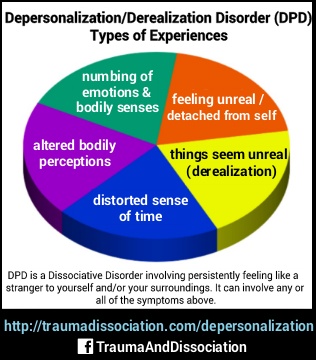

Occasional, brief moments of mild depersonalization can be experienced by many members of the general population however, depersonalization-derealization disorder occurs when these feelings are strong, severe, persistent, or recurrent and when these feelings interfere with daily functioning. Some other factors that are identified as relieving symptom severity are diet or exercise, while alcohol and fatigue are listed by some as worsening their symptoms.

Distracting oneself (by engaging in conversation or watching a movie, for example) may also provide temporary relief. įactors that tend to diminish symptoms are comforting personal interactions, intense physical or emotional stimulation, and relaxation. This commonly leads to an increase of anxiety and obsession, which contributes to the worsening of symptoms. The majority of people with depersonalization-derealization disorder misinterpret the symptoms, thinking that they are signs of serious psychosis or brain dysfunction. įirst experiences with depersonalization may be frightening, with patients fearing loss of control, dissociation from the rest of society and functional impairment. The inner turmoil created by the disorder can also result in depression. These experiences which strike at the core of a person's identity and consciousness may cause a person to feel uneasy or anxious. These individuals sometimes lack the "feeling" of a memory where they are able to recall a memory but feel as if they did not personally experience it.

Additionally some individuals experience difficulty concentrating and problems with memory retrieval. In some cases, individuals may be unable to accept their reflection as their own, or they may have out-of-body experiences. Individuals with the disorder commonly describe a feeling as though time is passing them by and they are not in the notion of the present. While depersonalization involves detachment from one's self, individuals with derealization feel detached from their surroundings, as if the world around them is foggy, dreamlike, or visually distorted. Individuals with depersonalization describe feeling disconnected from their physicality feeling as if they are not completely occupying their own body feeling as if their speech or physical movements are out of their control feeling detached from their own thoughts or emotions and experiencing themselves and their lives from a distance. People who are diagnosed with depersonalization also often experience an urge to question and think critically about the nature of reality and existence. The core symptoms of depersonalization-derealization disorder is the subjective experience of "unreality in one's self", or detachment from one's surroundings. While brief episodes of depersonalization or derealization can be common in the general population, the disorder is only diagnosed when these symptoms cause substantial distress or impair social, occupational, or other important areas of functioning. The chronic form of the disorder has a reported prevalence of 0.8 to 1.9%. While depersonalization-derealization disorder was once considered rare, lifetime experiences with it occur in about 1–2% of the general population. A diagnosis is made when the dissociation is persistent and interferes with the social or occupational functions of daily life. ĭiagnostic criteria for depersonalization-derealization disorder includes persistent or recurrent feelings of detachment from one's mental or bodily processes or from one's surroundings. In rare cases, symptoms can last for years. However, in some situations the dissociated state may last for hours, days, or even weeks at a time. Individuals with the disorder may remain in a depersonalized state for the duration of a typical panic attack. Triggers may include significant stress, panic attacks, and drug use. Adverse early childhood experiences, specifically emotional abuse and neglect have been linked to the development of depersonalization symptoms. ĭepersonalization-derealization disorder is thought to be caused largely by interpersonal trauma such as childhood abuse. Individuals experiencing derealization may report perceiving the world around them as foggy, dreamlike/surreal, or visually distorted. Derealization is described as detachment from one's surroundings. Individuals may report feeling as if they are an outside observer of their own thoughts or body, and often report feeling a loss of control over their thoughts or actions. Depersonalization is described as feeling disconnected or detached from one's self. Medical condition Depersonalization-derealization disorderĭepersonalization-derealization disorder ( DPDR, DPD) is a mental disorder in which the person has persistent or recurrent feelings of depersonalization and/or derealization.


 0 kommentar(er)
0 kommentar(er)
